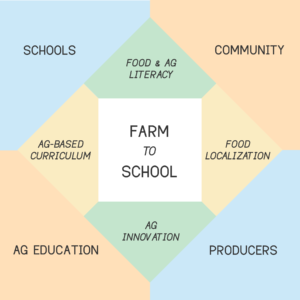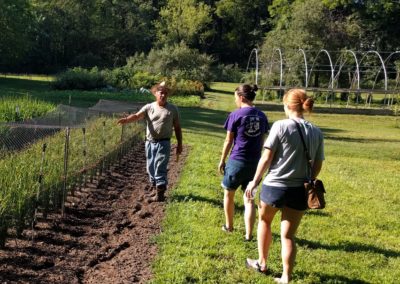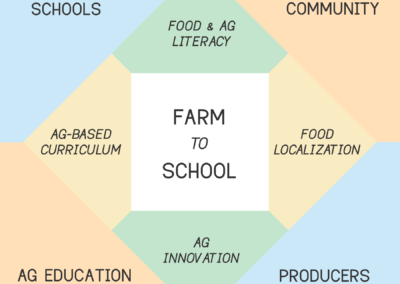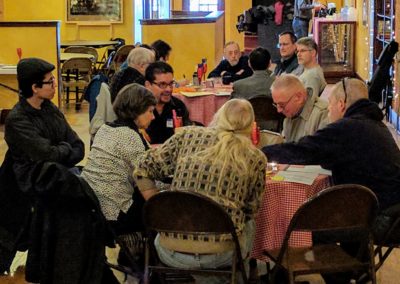FarmLab Feasibility Study
 This study evaluates the feasibility of a farm-based education center within the Middlebury Ag TIF district. Recognizing the need for local food production partnerships, facilities, and training to access new local and regional markets, the Elkhart County Redevelopment Commission allocated TIF funds to support this study in assessing the potential development opportunities for corresponding FarmLab activities.
This study evaluates the feasibility of a farm-based education center within the Middlebury Ag TIF district. Recognizing the need for local food production partnerships, facilities, and training to access new local and regional markets, the Elkhart County Redevelopment Commission allocated TIF funds to support this study in assessing the potential development opportunities for corresponding FarmLab activities.
The feasibility study proposal submitted to the Redevelopment Commission includes three phases:
- Phase 1 – Needs Assessment: Identify and quantify needs and opportunities for a farm based education facility that serves schools as well as the food production industry.
- Phase 2 – Program Identification and Development: First level financial feasibility test, and foundation for business plan.
- Phase 3 – Business Plan Development: Fully developed business and facility plan that can establish organizational structure and financial operations.
The vision for the proposed FarmLab project was conceived by Elkhart County Commissioner Mike Yoder as a strategy for preserving local agricultural land and capacity by restructuring Crystal Valley Dairy Farms to support a farm-based experiential learning center. The initially envisioned activities included collaboration with local schools to provide field trips and hands-on learning, supervised agricultural experiences (SAE), and summer work experience and mentoring programs for students interested in ag-related careers. The ongoing operations of the farm would provide partial financial support for the operations of the learning center.
As Yoder’s vision continued to evolve, other complementary initiatives emerged, including new ag education programming in Elkhart Community Schools through the Elkhart Area Career Center. ECS has also begun developing the Agriculture Community Center and Environmental Learning Lab (ACCELL) as a similar ag-based experiential learning site in collaboration with the Elkhart County Farm Bureau. Fairfield Community Schools built a cutting edge veterinary surgical lab in support of their ag education program. Throughout Elkhart County school districts, there is increasing interest in food and agriculture as a focus for curricula based on experiential learning and problem-based learning pedagogies. At the same time, a growing local food movement continues to generate unmet demand for local producers willing to diversify production and serve new markets.
The FarmLab project will be a farm-based education center that:
- Sustains and expands local agricultural knowledge
- Promotes agricultural career pathways
- Preserves agricultural land and productivity
- Improves access to local, healthy food
- Opens new markets for local food production
The Phase 1 report focused on assessing the needs of four key constituencies in the context of
agriculture and education: producers, consumers, schools, and ag education. The report
verified alignment of the identified needs and opportunities with the FarmLab aims, and
proposed specific focus areas for FarmLab activities:
- Food and ag literacy
- Ag-based curricula
- Ag innovation
- Food localization as economic development
Supporting and advocating for increased ‘farm to school’ activities throughout the county
emerged as a central focus for advancing these interests.
Appendices:
- Appendix A – Elkhart County Ag Overview: surveys available data relevant to local consumers and producers to identify and understand ag trends.
- Appendix B – Amish Influence: considers the potential influence of area Amish populations on local agriculture and the unique capacities they bring.
- Appendix C – Ag Education Background: provides an overview of ag education resources supporting current programs that could benefit other schools.
- Appendix D – Food Services in Elkhart County Schools: summarizes current local food interest and procurement efforts among school food services in Elkhart County.
- Appendix E – Food and Ag Literacy: addresses two frameworks for helping consumers make more informed, healthful decisions about the foods they consume.
- Appendix F – Agricultural Innovation: discusses current innovations in agriculture relevant to local needs, capacities, and potential relevant to possible FarmLab operations.
- Appendix G – Food Localization as Economic Development: examines various studies supporting food localization as a means of economic development.
- Appendix H – Farm to School: describes the concept and application of farm-to-school programs.
- Appendix I – Questions: Offers guiding questions for the FarmLab to consider as it moves forward.
- Appendix J – Interview Summaries: Summaries of the interviews conducted by the project consultants with leaders from key constituencies.
- Appendix K – Bibliography
The purpose of this report is to fulfill Phase 2 of the FarmLab Feasibility Study by identifying potential programs and activities and developing a foundation for a sustainable business plan. The Phase 1 Needs Assessment identified Farm to School (FTS) as a strategic focus area for the FarmLab and characterized the current context for program development.
This report describes potential FTS activities that could fulfill the original FarmLab aims for supporting local food production and agricultural education, while also catalyzing food systems innovation and enterprise as part of a broader food localization strategy for economic development. At the heart of these activities are the essential FarmLab functions of facilitating new cross-sector connections and collaboration among existing stakeholders, and of providing a “lab-based” environment for sustained innovation and education. The report concludes with descriptions of specific projects that could serve as prototypes for FarmLab programs and with recommendations for incorporating as a not-for-profit organization to access available funding.














